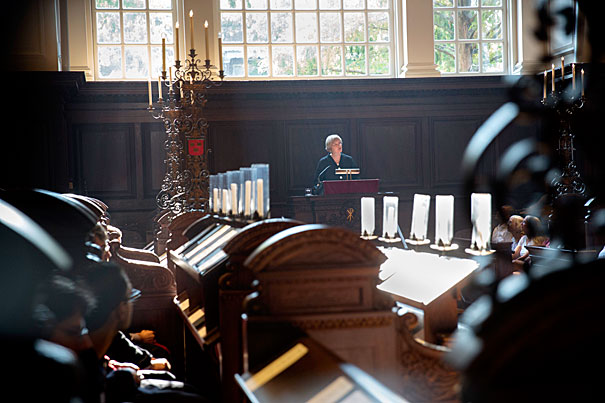
During her remarks at the first Morning Prayers of the academic year in Memorial Church’s Appleton Chapel, President Drew Faust (photo 1) told listeners that the University celebrates the differences within its community as “an integral part of everyone’s education.” Lucy Forster-Smith (left, photo 2), Sedgwick Chaplain to the University and the church’s senior minister, officiated the service. The Harvard University Choir was also part of the morning service (photo 3).
Kris Snibbe/Harvard Staff Photographer
Faust seeks even greater inclusion
At first Morning Prayers of academic year, Harvard president promotes diversity and its complexity
Harvard’s dedication to diversity and inclusion is unwavering, said President Drew Faust on Wednesday morning, but the University still must do more.
During her remarks at the first Morning Prayers of the academic year in Memorial Church’s Appleton Chapel, Faust told listeners that the University celebrates the differences within its community as “an integral part of everyone’s education.”
“I often remark that for many if not most of those arriving at Harvard for the first time, this is the most varied community in which they have ever lived — perhaps will ever live,” she said. “People of different races, religions, ethnicities, nationalities, political views, gender identities, sexual orientations.”
She emphasized that fostering a culture of inclusion must be a fundamental part of Harvard’s longstanding efforts to create campus diversity.
“Simply gathering a diverse mixture of extraordinarily talented people in one place does not in itself ensure the outcome we seek,” said Faust. “Everyone at Harvard should feel included, not just represented in this community. ‘I, Too, Am Harvard’ must be a statement every one of us can confidently make. Diversity must become belonging.”
President Drew Faust at Morning Prayers
Faust also referenced an ongoing lawsuit contesting the University’s use of race as one among many factors considered in an admissions process designed to learn about the whole applicant, a policy held up as a model by the U.S. Supreme Court in 1978 and repeatedly reaffirmed since.
“Our vigorous defense of our procedures and of the kind of educational experience they are intended to create will cause us to speak frequently and forcefully about the importance of diversity in the months to come,” said Faust.
She urged her listeners to embrace tolerance and understanding and encouraged them to reframe difficult conversations and uncomfortable encounters.
“Can we together turn what we might leap to label as ‘micro-aggressions’ into a teachable moment? Can we explain why phrases like ‘off the reservation’ or words like ‘lynching’ have a different and powerful resonance for individuals who hear them within a heritage of violence and oppression? Can we make our lives together the subject for inquiry and exploration and understanding in something of the same spirit with which we approach our academic purposes?”
Building a community of inclusion helps challenge inequality and injustice, said Faust, both at Harvard and beyond. But that work isn’t simple, in part because of the University’s commitment to freedom of speech.
“In the course of the year to come, that freedom is likely to produce some utterances that we deplore. And there will be times we must speak out against them. But we are likely far more often to encounter good intentions gone awry, mistakes and misunderstandings that are an inevitable part of this experiment in diversity we at Harvard are so committed to defend — in the courts, in the public discourse, and in our lives together.
“Listen hard,” she recommended, “listen generously, risk making a mistake, risk being made uncomfortable, risk forgiveness. Learn from one another.”
With the mercury soaring, Wednesday felt more like a prime beach day than the start of another school year. But despite the midsummer conditions, the time-honored tradition signaled that Harvard’s academic calendar is again underway. Lucy Forster-Smith, Sedgwick Chaplain to the University and the church’s senior minister, officiated the service. Her closing words echoed Faust’s sentiments in a theological sense.
“For the holy rays of insight that arrive when we least expect them, startle us afresh, Holy One,” Forster-Smith said in her benediction. “For the joy of service that clears the way for justice and peace, give us strength and compassion.”




